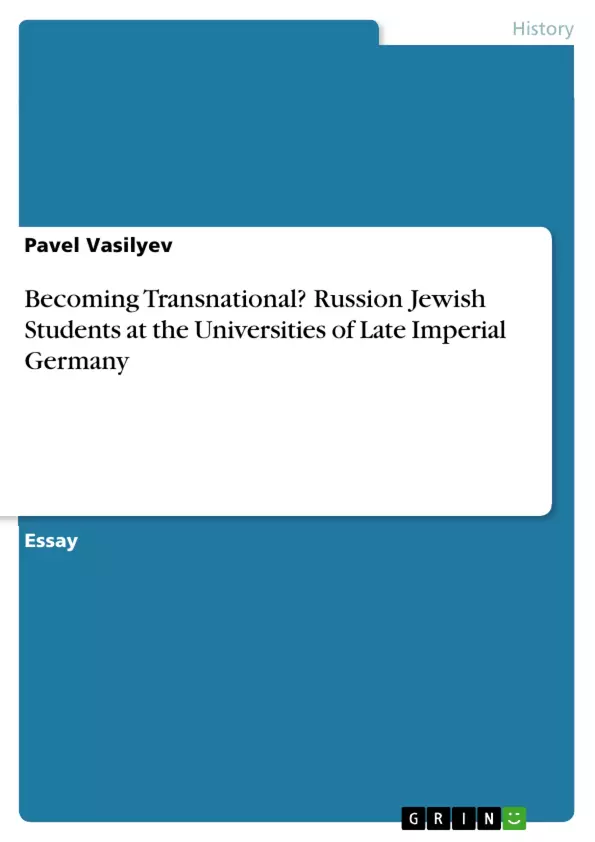One of the primary values of the contemporary world is education. The scholars and laymen alike have noticed the ever-increasing role that information and knowledge play in our lives. Nearly all young people in the developed countries get their college degrees, and in many metropolitan areas in Europe and North America the graduate (Master's) degree is gradually becoming a compulsory requirement as well. Education is also intrinsically linked with mobility and transnationalism, since contemporary technology and transportation allows those craving for knowledge to move around the world in their quest – thus transforming both the students' identities and the host communities.
However, it was just not always like that. The developments that are described above present a rather recent trend. In this paper I would like to focus on the experiences of Russian Jewish students at the universities of late Imperial Germany – and for some reasons. In European context, the Jews have received a specific dual status as both well-educated “people of the Book” and discriminated pariahs, excluded from universities and academia more generally. Russian Jews struggled with additional complications, since they were both the members of the transnational religious community with rich history and tradition and the subjects of the multi-national empire which wanted to look as an enlightened and modern European state, but still remained arguably the most backward and autocratic country on the continent. The chronological boundaries (late 19th – early 20th centuries) are determined by the fact that in this period more and more Russian Jews, whose educational opportunities were seriously hindered at home, explored the possibility of studying in Germany. In my opinion, the look at the ideas, personalities and presentations that resulted from the interactions between Russian Jewish students from the Pale of Settlement and the ivory tower world of German universities can tell us much about new identities that were emerging around fin-de-siècle.
Accordingly, in this paper I plan to examine and analyze the background of Russian Jewish students and their years at the universities of late Imperial Germany in order to show how their previous identity was at the same time shaken and strengthened – and then transformed into a new one based on their transnational experiences.
Inhaltsverzeichnis (Table of Contents)
- Becoming Transnational? Russian Jewish Students at the Universities of Late Imperial Germany
- The Students: Ostjuden from the Pale or Motivated Learners?
- The Universities: Ivory Tower or Political Battlefield?
Zielsetzung und Themenschwerpunkte (Objectives and Key Themes)
This paper examines the experiences of Russian Jewish students at the universities of late Imperial Germany, focusing on how their previous identity was shaped and transformed by their transnational experiences. It aims to show how these students navigated the challenges of discrimination and societal restrictions while pursuing higher education in a seemingly more liberal environment.
- The impact of Russian Imperial restrictions on Jewish education
- The motivation and social backgrounds of Russian Jewish students
- The role of education in Jewish emancipation and identity formation
- The influence of German culture and society on Russian Jewish students
- The diversity of political orientations and social groups among Russian Jewish students
Zusammenfassung der Kapitel (Chapter Summaries)
- The first chapter explores the motivations behind Russian Jewish students choosing to study in Germany. It addresses the stereotypical portrayal of these students as being “naive and traditional” and examines their diverse backgrounds and political orientations.
- The second chapter examines the role of German universities in shaping the identities of Russian Jewish students. It explores the attitudes of Russian Jewish students towards their host country and the challenges they faced in navigating a new cultural and academic environment.
Schlüsselwörter (Keywords)
The key themes of this paper include Russian Jewish identity, transnationalism, education, emancipation, late Imperial Germany, social history, cultural history, and the Ostjuden.
Frequently Asked Questions
Why did Russian Jewish students go to Germany for education?
Educational opportunities for Jews were severely hindered in the autocratic Russian Empire, leading many to seek higher education in German universities.
What was the "Pale of Settlement"?
It was the region of the Russian Empire where Jews were permitted to live, often facing discrimination and social restrictions.
How did studying in Germany transform their identity?
Their previous identities were both shaken and strengthened, evolving into new transnational identities through interaction with German academic and cultural life.
Were these students a politically uniform group?
No, they represented a great diversity of political orientations and social backgrounds, ranging from traditionalists to highly motivated political learners.
What is the significance of the "ivory tower" in this context?
It refers to the world of German universities, which served as both a place of pure knowledge and a political battlefield for emerging Jewish identities.
- Quote paper
- Pavel Vasilyev (Author), 2010, Becoming Transnational? Russion Jewish Students at the Universities of Late Imperial Germany, Munich, GRIN Verlag, https://www.grin.com/document/163784



